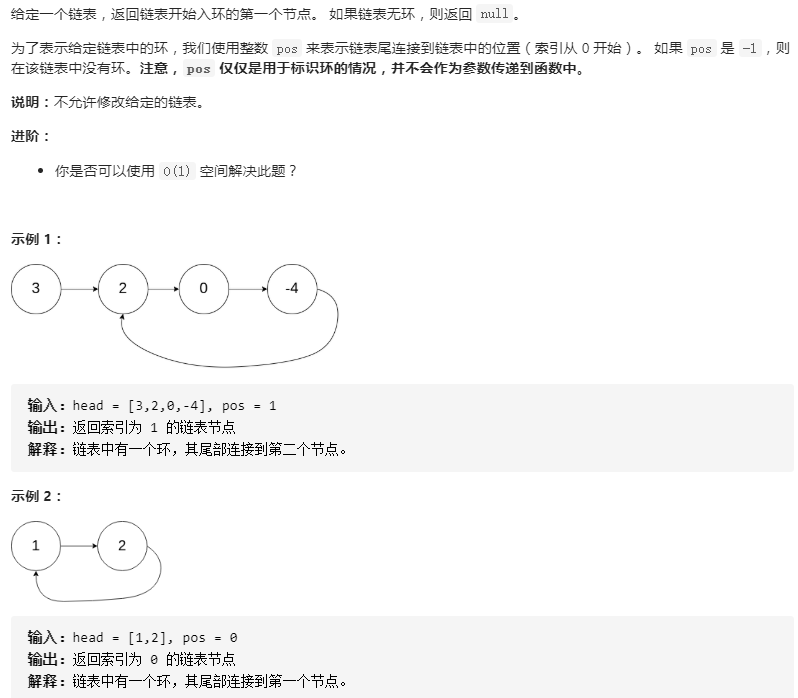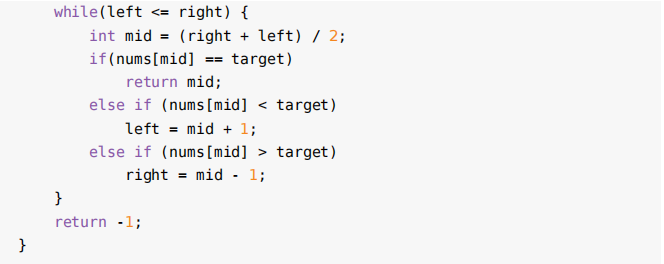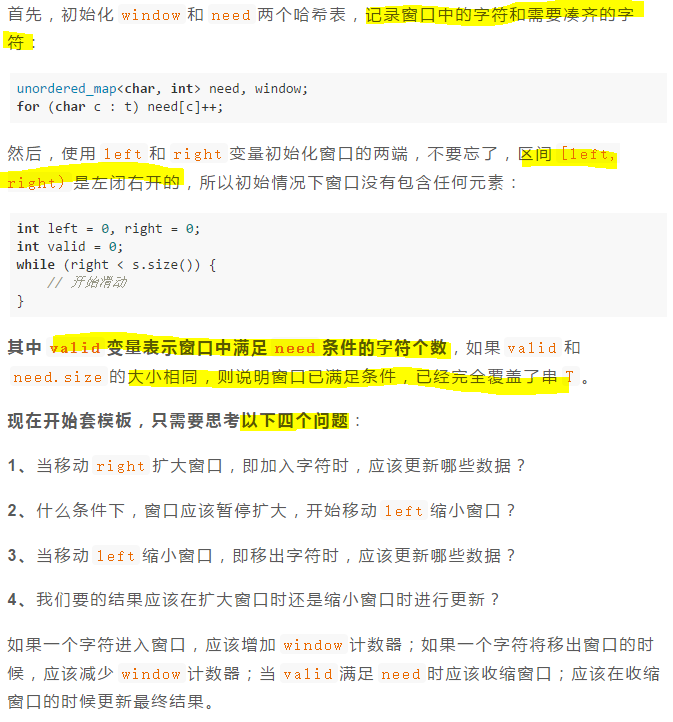一、双指针技巧总结
1、快慢指针
1、判定链表中是否含有环
141.环形链表https://leetcode-cn.com/problems/linked-list-cycle/


class Solution:def hasCycle(self, head: ListNode) -> bool:slow, fast = head, headwhile fast!=None and fast.next!=None:slow = slow.nextfast=fast.next.nextif slow == fast:return Truereturn False
2、已知链表中含有环,返回这个环的起始位置
142.环形链表2https://leetcode-cn.com/problems/linked-list-cycle-ii/

class Solution(object):def detectCycle(self, head):fast, slow = head, headwhile fast and fast.next:fast, slow = fast.next.next, slow.nextif fast == slow:breakslow = head # 注意这一步while fast != slow:fast, slow = fast.next, slow.nextreturn slow
3、寻找链表的中点

while fast and fast.next:fast, slow = fast.next.next, slow.nextreturn slow
4、寻找链表的倒数第 k 个元素
√·5、26、删除有序数组中的重复项

class Solution:def removeDuplicates(self, nums: List[int]) -> int:i,j=0,0if len(nums)<2: return len(nums)for i in range(1,len(nums)): # 注意 (1,N)if nums[i]!=nums[i-1]: # 注意j+=1nums[j]=nums[i]return j+1
√·6、27. 移除元素

class Solution:def removeElement(self, nums: List[int], val: int) -> int:j=0for i in range(len(nums)):if nums[i]!=val:nums[j]=nums[i]j+=1return j
2、左右指针
1、⼆分查找
2、两数之和
3、反转数组
3、不知道什么指针
1、剑指 Offer 24. 反转链表
# Definition for singly-linked list.# class ListNode:# def __init__(self, x):# self.val = x# self.next = Noneclass Solution:def reverseList(self, head: ListNode) -> ListNode:pre, cur = None, headwhile cur:nxt = cur.nextcur.next = prepre = curcur = nxtreturn pre
2、剑指 Offer 25. 合并两个排序的链表
# Definition for singly-linked list.# class ListNode:# def __init__(self, x):# self.val = x# self.next = Noneclass Solution:def mergeTwoLists(self, l1: ListNode, l2: ListNode) -> ListNode:cur = dum = ListNode(0) # 伪头结点!绝了while l1 and l2:if l1.val < l2.val:cur.next, l1 = l1, l1.nextelse:cur.next, l2 = l2, l2.nextcur = cur.nextcur.next = l1 if l1 else l2return dum.next
√·3、88. 合并两个有序数组(逆序指针)
class Solution:def merge(self, nums1: List[int], m: int, nums2: List[int], n: int) -> None:"""Do not return anything, modify nums1 in-place instead."""n1=mn2=nres=m+n-1while n1 and n2:if nums1[n1-1]<nums2[n2-1]:nums1[res]=nums2[n2-1]n2-=1else:nums1[res]=nums1[n1-1]n1-=1res-=1if n2>0: nums1[:n2]=nums2[:n2]
√4、28. 实现 strStr()

class Solution:def strStr(self, haystack: str, needle: str) -> int:i,j=0,0n=len(needle)if n==0 :return 0while i<len(haystack):if haystack[i]==needle[j]:j+=1n-=1i+=1 # 注意else:i=i-j+1 # 注意j=0n=len(needle)if n==0:return i-len(needle)return -1
二、滑动窗口
1、最小覆盖子串
2、字符串排列
3、找所有字母异位词


画圈的那个部分,可以保证不包含其他的字符串。
当right-left==t.size 时, 不符合条件,说明含有其他的字符串,这个时候会对左边界进行更新。
但是怎么排除结果和字符是字母一样,顺序不一样呢
4、最长无重复子串
×5、220. 存在重复元素 III
# class Solution:# def containsNearbyAlmostDuplicate(self, nums: List[int], k: int, t: int) -> bool:# for i in range(len(nums)):# for j in range(1,k+1):# if i+j<len(nums) and abs(nums[i]-nums[i+j])<=t:# return True# return Falseclass Solution(object):def containsNearbyAlmostDuplicate(self, nums, k, t):from sortedcontainers import SortedSetst = SortedSet()left, right = 0, 0res = 0while right < len(nums):if right - left > k: # 移动窗口st.remove(nums[left])left += 1# 在st中查找nums[right] - t,存在时返回nums[right] - t左侧的位置,不存在返回应该插入的位置.index = bisect.bisect_left(st, nums[right] - t)if st and index >= 0 and index < len(st) and abs(st[index] - nums[right]) <= t:return Truest.add(nums[right])right += 1return False


































